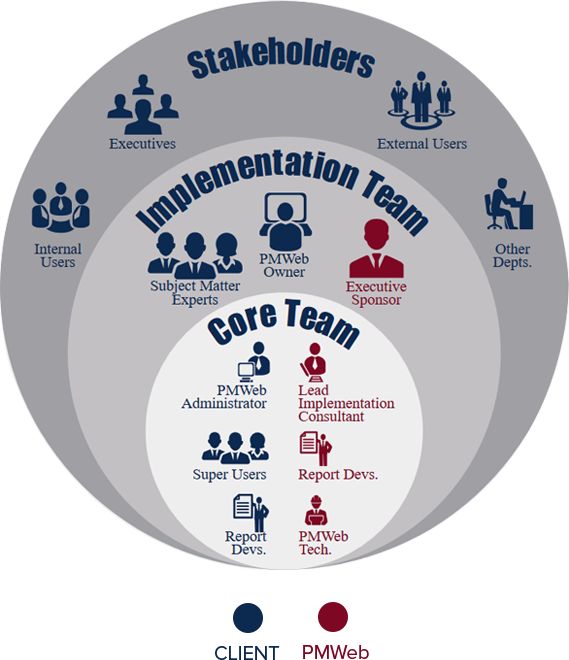Understanding client needs
At HKA Tech we have over a decade of experience implementing program/project management systems for hundreds of clients. Over that time we have molded our approach to be the most effective at executing the widespread organizational change that these systems often require. We feel it is why our clients' implementations are so successful year after year.
- Tyler Monson, Principal, Director of Professional Services
Our Process
HKA Tech’s experience, knowledge, and expertise - coupled with a proven process - is our synergistic approach to help ensure a successful deployment and adoption for our clients. We employ a combination of traditional waterfall and agile methodologies in our project management approach.
Our Implementation Methodology provides our clients with a proven process of successfully deploying software. Our approach provides a standardised method for managing the entire planning, testing and implementation process while building a solid foundation to help ensure a successful deployment and adoption for our clients.
Our implementation methodology incorporates years of hands-on experience with industry-accepted processes and procedures. Our experience has shown that a successful implementation requires two key elements:
End User Involvement & Agility
We have found that it is extremely important for user adoption and satisfaction that the implementation team be able to receive feedback and quickly incorporate that feedback into the system. A key element to facilitating this feedback is the identification and involvement of subject matter experts from within the client organization. These experts are typically involved throughout the implementation process, not only providing critical feedback but also interacting with other users and stakeholders.
We achieve this through the “agile” implementation approach with elements of Scrum and traditional PM. The following are a few benefits to this hybrid process:
- Planned Phases or Releases
- Train the Trainer
- Integrated implementation team
- Immediate user feedback
- User Requirements
- Vision
- Identify Team and Roles
- Pre-Kickoff Call
- Feature Roadmap
- Release Planning
- Super User Training
- Sprint Planning
- Begin 1st Sprint
- Analyze, Design, Configure, Test
- 1-2 (2 hour) Configuration Sessions Per Week
- Consultant shows out-of-box features
- Discovery and gap analysis
- Action items for next session
- Testing of configuration
- End of Sprint Review/Planning Meeting
- Demonstrate working configs from the sprint
- Identify outstanding issues
- Review feature backlog and plan next Sprint
- End User Training
- End User Support
Experience with multiple products:
- PMWeb
- Oracle Contract Manager / Expedition
- Oracle/Skire Unifier
- Oracle P6
- Trimble Prolog
- eBuilder
- eDocs
- EADoc
- SharePoint
Integration Experience:
- SAP
- Oracle
- Timberline
- ViewPoint
- DB2
- Ellipse
- eCMS
- Epicor
- AS400
- SharePoint
- Oracle P6
Assembling The Team
A successful implementation depends on a well integrated team of both HKA Tech and client staff. The level of involvement by each team member will vary by role and availability but all will be involved at some level. Some of the key staff to highlight include:
PMWeb Owner: This is one of the most important roles for the client organization. The PMWeb owner manages priorities, budget, stakeholder feedback, testing/acceptance, client resources, and is a single point of communication between the client team and HKA Tech.
Lead Implementation Consultant: The lead consultant is the HKA Tech point of contact with the PMWeb owner. They are responsible for guiding the team through implementation, training the core team, assisting the PMWeb owner in defining and maintaining priorities, leading configuration work sessions, coordinating HKA Tech resources, and providing implementation and industry expertise.
- PMWeb Administrator: The long term responsibility for maintaining/administering the PMWeb system is the responsibility of the administrator. During implementation they will learn how to configure PMWeb, manage users, identify and manage future upgrades/enhancements, and gather user feedback to be presented to the PMWeb Owner / core team.
Super Users: Including a team of super users is critical to both a successful implementation and user adoption. These are typically subject matter experts from within the client organization. During implementation they will become experts in using PMWeb, conduct testing of implemented modules/reports, evangelize/promote PMWeb to other users, conduct/participate end-user training, and collecting/providing feedback.


